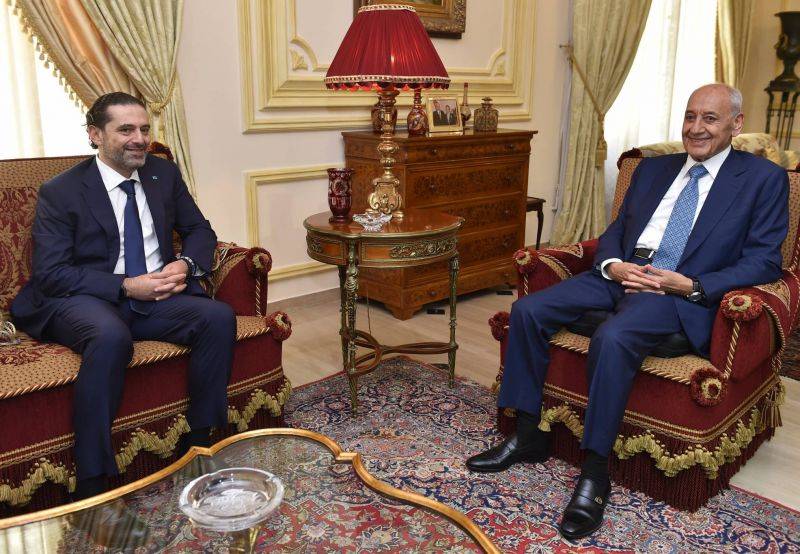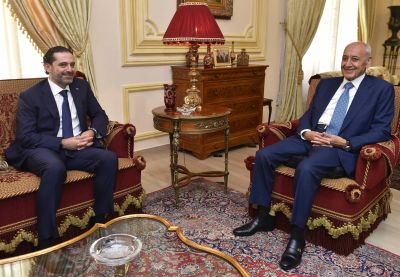
Berri and Hariri met on Monday. (Credit: Hassan Ibrahim/Lebanese Parliament)
Parliament Speaker Nabih Berri clung to his initiative of a breakthrough in the cabinet formation process until the very end. The initiative was not, however, born overnight and he knew very well that the failure of his efforts in this direction were a foregone conclusion.
Then why did he engage in a fool’s game that only makes the population a little angrier? Because the legislature head knows Lebanon well enough. He knows its taste for reconciliations and lame compromises and its undying hope to see a little light at the end of the tunnel.
Berri was well aware that the conditions for a cabinet formation breakthrough were not “conducive, neither at home nor abroad,” a close associate of the Amal Movement leader said.
“He also knows that Michel Aoun does not want Saad Hariri to lead the government, and the latter refuses to form a cabinet for various reasons, mainly related to his regional political patrons. Hariri also fears that he would be the one to bear the brunt of the explosion of the financial, economic and social situation,” the source added.
Berri still wanted to give it a shot. As he impatiently waited for the premier-designate’s return from the United Arab Emirates, he was asked by a prominent politician the following question: “Mr Speaker, you want Hariri to form a government and you are doing your best to make it happen. But what if Hariri had external instructions not to do it? Will Hariri listen to you or to those who are asking him to refrain from forming a cabinet?”
This prominent politician was alluding to reports that the UAE and Egypt do not wish to see the Future Movement head forming a cabinet, unless on their own terms, and therefore want him to maintain the status-quo.
“I will do what I have to do. The country needs a government and it needs to be formed,” Berri replied, pushing forward his initiative with the support of Hezbollah Secretary-General Hassan Nasrallah.
The speaker was counting on the fact that President Michel Aoun and his son-in-law and head of the Free Patriotic Movement Gebran Bassil would not block the initiative since it was endorsed by their precious ally, i.e., Nasrallah, whom they would not want to annoy.
“Nasrallah set the main lines [of the initiative]: the president would not resign and the premier-designate would not step down,” a source close to the Shiite party said.
Hariri returned on Monday from his trip after a detour through Paris, where he met President Emmanuel Macron’s diplomatic adviser, Patrick Durel, one of the most active French diplomats in relation to the Lebanese dossier.
“Durel was very firm with Hariri on the need to form a government swiftly, and asked him to recuse himself if he does succeed in doing so within a few days,” a French diplomat said on condition of anonymity. Progressive Socialist Party leader and former MP Walid Joumblatt was also in Paris during the same time.
“The French were really pessimistic when they spoke to him. They said that Hariri was better off stepping down and that all the attention ought to be focused on the parliamentary elections,” a source close to the Druze leader said.
Berri was undoubtedly aware of all of this, but he still clung to his plans.
‘Is there an external problem?’
Step one: convince Hariri to back off. As soon as he arrived in Beirut, the premier-designate immediately went to meet with Berri at the speaker’s Ain al-Tineh residence. Hariri did not have yet a cabinet lineup draft, but both men were discussing the possibility of a cabinet of 24 ministers.
The Future Movement leader had so far opposed the idea. Berri said, “We have to work for the cabinet formation process on two levels. First, the allocation of portfolios and quotas, and second, the list of names.”
The legislature head proposed a distribution of portfolios according to his initiative of a cabinet of 24 ministers with no party retaining a blocking third veto power as follows: eight ministers for the president (seven Christians, including one from the Tashnag Party, and a Druze representative of Talal Arslan’s party); eight ministers for Hezbollah’s bloc (two for the Shiite party, three for the Amal Movement, two for Sleiman Frangieh’s Marada Movement and one for the Syrian Social Nationalist Party). The remaining names would be Hariri’s share.
Hariri would have four ministers, five if the prime minister is included, in addition to the Druze minister of Joumblatt’s PSP.
There remain two Christian ministers that Hariri has insisted on appointing to have a share of eight ministers, just like the other two camps.
In this formula, Hariri would give the Interior Ministry portfolio to a minister from the president’s camp in addition to the Defense Ministry, and would take the Justice Ministry.
The Foreign Ministry would go to the PSP and the Energy Ministry to the Marada Movement, while Hezbollah would hold the Ministry of Public Works and Amal the Finance Ministry.
During the meeting, Berri pushed Hariri to his limits. He asked him three times: “Is there an external problem that prevents the formation of the government? If there is anything that is obstructing your work, let me know.”
The prime minister-designate said no, insisting that there was no outside interference in his effort to form the cabinet and that he was ready to form it if the president agreed. But Hariri was not fooling anyone. He was just not ready to budge an inch.
‘But who will name the last two Christian ministers?’
Step two: convincing Bassil to give way.
At the end of the meeting, Berri sent his political assistant Ali Hassan Khalil to brief Hezbollah’s Hussein Khalil on the meeting’s outcome.
Hezbollah’s representative immediately set up a meeting with Bassil in Bayada. But the president’s son-in-law told his guests that he would be waiting for them at the Baabda Presidential Palace.
Bassil seemed optimistic, saying that the formula worked for him, but insisted on the need to discuss the names of the ministers so he could make some changes, requesting more time to think things through.
Both Amal’s Khalil and Hezbollah’s Khalil were quite satisfied. The government was starting to take shape. But as the two men were about to leave, Bassil warned them that he would oppose the Marada Movement getting its hands on the Energy Ministry and asked them: “But who will name the last two Christian ministers?” And with that, it was back to square one. Ali Hassan Khalil replied that if Bassil was to name them, “he would have 10 ministers and Hariri six, which is illogical.”
The FPM leader insisted: “I will not let Hariri name a Christian minister.” The mood changed dramatically. Ali Hassan Khalil appeared exasperated. He knew the comment sent them all back to the drawing board again. “See with the president what would be possible for you and get back to us,” he told Bassil.
Hariri, on the other hand, assured anyone who would listen that he was going to come up with a cabinet lineup within 24 hours after meeting with former prime ministers, his parliamentary bloc and the Future Movement political bureau.
The next day, the premier-designate met with former ministers. During the meeting he reportedly insisted that he would not make any concessions and maintained that he would be the one to name the two Christian ministers because it was his constitutional right to do so.
Bassil “cannot impose any name on me. This is an insult. If the president wants eight ministers, the Strong Lebanon bloc has to give me their vote of confidence,” Hariri said.
Because otherwise, the president can only have three ministers. The war was back on.
Bassil held a late afternoon press conference in which he said he wanted a government led by Hariri, while making a few cutting remarks against the premier-designate.
The Future Movement responded with a vitriolic press statement denouncing a “political swamp” — led by Bassil, “the shadow president,” who is protected by his political patron, the president himself — into which the Lebanese are being thrown.
Hariri’s statements angered Berri, who saw his initiative failing on all sides. “You didn’t have to attack Michel Aoun,” Berri reportedly scolded the premier-designate.
The Maronite Patriarch Bechara al-Rai was also angry and headed to Baabda to calm the situation.
“Do you accept that the president is being offended?” Aoun asked him.
The president accused Hariri of being behind the obstruction of cabinet formation. Bassil, for his part, believed that his nemesis was seeking to consolidate his popular base by presenting himself as the hero of the Sunni cause.
“Hariri is finished politically, and at the Sunni and Arab levels, and Hezbollah continues to back him,” Bassil lamented.
‘Push Berri to end his support of Hariri’
Berri has failed. He is powerless in the face of so much animosity on both sides. Only the might of Hezbollah could break the stalemate. Yet, even the Shiite party does not hold all the cards in such situations.
“Hezbollah does not intend to put pressure on Michel Aoun, especially since it sees that there is no will on the Sunni side to form a government,” a source close to the Shiite party said.
If Hezbollah was “pressuring Aoun and Bassil, it is as if it was doing a service to Hariri and Samir Geagea, the leader of the Lebanese Forces. Hezbollah actually wanted to embarrass Berri, who was insisting on backing Hariri. The Shiite party wanted Berri to see for himself that the premier-designate is the reason behind the political paralysis. It wanted to prompt Berri to end his support of the premier-designate,” a political source opposed to Hezbollah said.
Hariri’s circles believe that Aoun and Bassil never would have been able to dig in their heels had they not been backed by Hezbollah.
The government formation farce is over. Now it is down to a standoff between Aoun and Hariri over who will formally pronounce its time of death.
This article was originally published in French. Translation by Sahar Ghoussoub.
